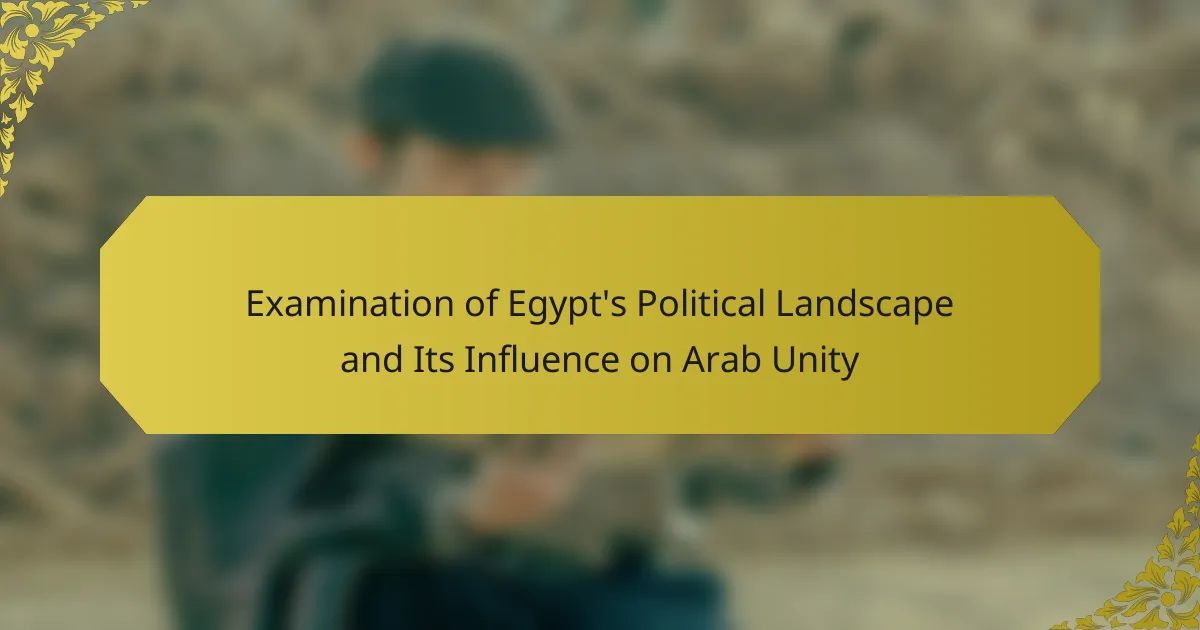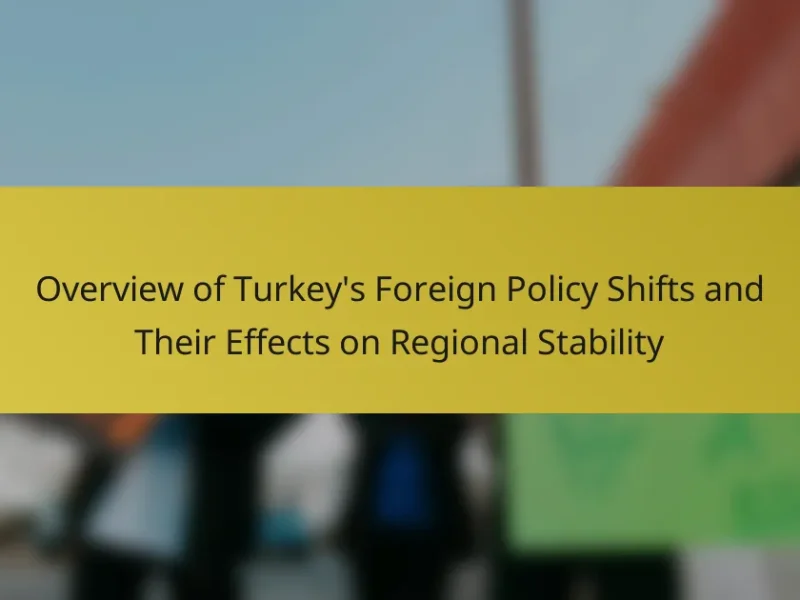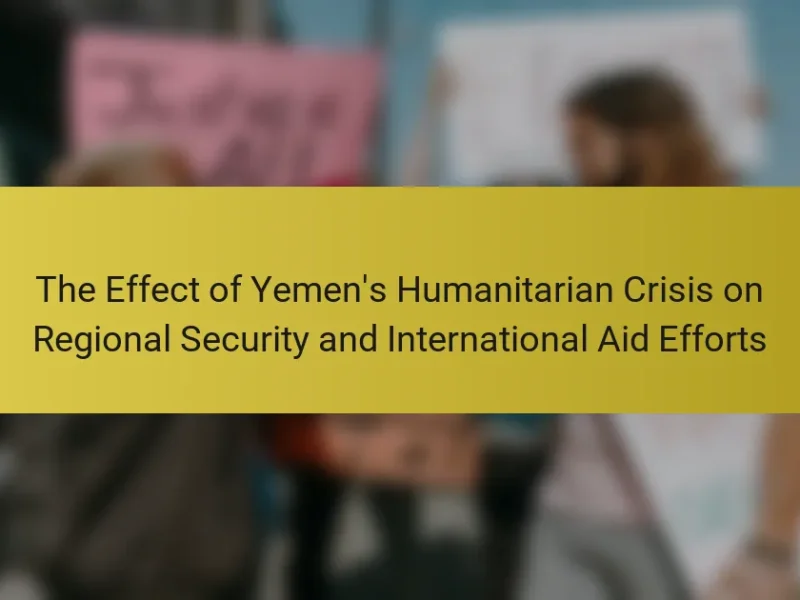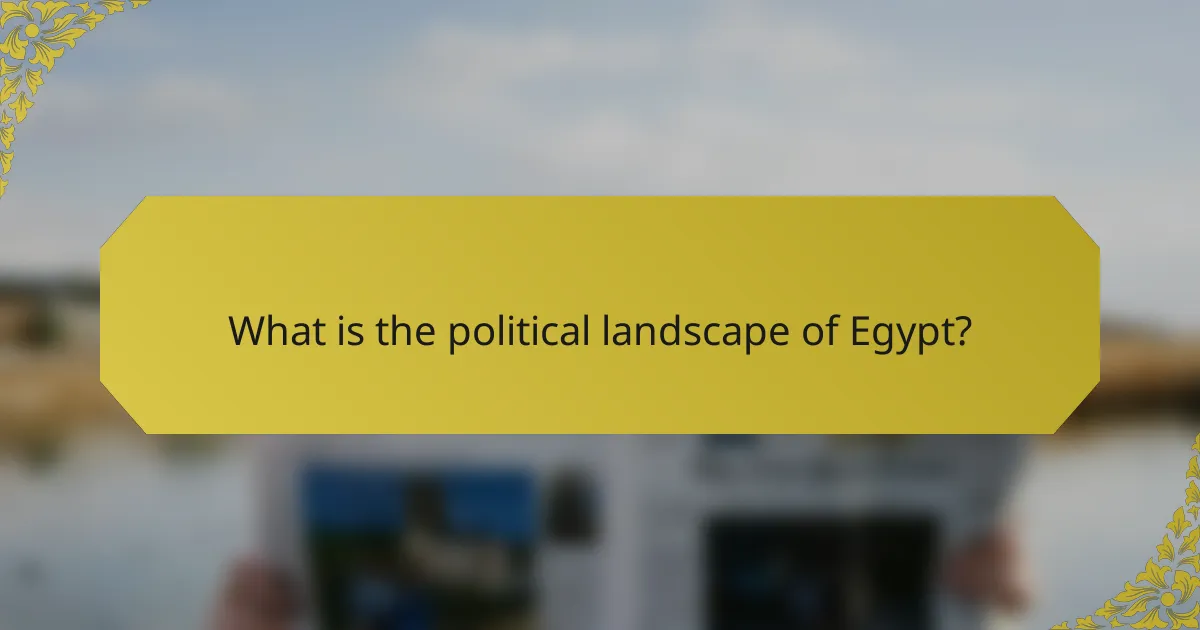
What is the political landscape of Egypt?
The political landscape of Egypt is characterized by a semi-presidential system. This system includes both a president and a prime minister. The current president, Abdel Fattah el-Sisi, has been in power since 2014. His government has faced criticism for human rights violations. Political opposition is limited, with many dissenters imprisoned. The Egyptian Parliament has a significant role but is often seen as lacking true power. Elections are conducted, but concerns about fairness persist. The military plays a crucial role in governance and public life. Overall, Egypt’s political environment is marked by stability but also repression.
How has Egypt’s history shaped its current political environment?
Egypt’s history has profoundly influenced its current political environment. The legacy of ancient civilizations established a strong sense of national identity. The Arab Spring in 2011 marked a significant turning point, leading to political upheaval. This movement aimed to challenge decades of authoritarian rule. The subsequent rise and fall of the Muslim Brotherhood showcased the struggle between secular and religious governance. Ongoing economic challenges have fueled public discontent and protests. Additionally, the military’s role in politics remains a significant factor. Historical conflicts, such as the Arab-Israeli wars, continue to shape Egypt’s foreign policy. Thus, Egypt’s rich and tumultuous history directly informs its contemporary political dynamics.
What key historical events have influenced Egypt’s political structure?
The key historical events that have influenced Egypt’s political structure include the establishment of the ancient Egyptian state, the Arab conquest in the 7th century, and the British occupation in the 19th century. The ancient Egyptian state, formed around 3100 BCE, established centralized governance under the pharaohs. The Arab conquest introduced [censured] and shifted political authority to caliphal rule, impacting governance and culture. The British occupation from 1882 to 1952 imposed colonial rule, leading to nationalist movements. The 1952 revolution resulted in the overthrow of the monarchy and the establishment of a republic. These events collectively shaped Egypt’s political identity and governance systems.
How have leadership changes affected political stability in Egypt?
Leadership changes in Egypt have significantly affected political stability. The 2011 revolution led to the ousting of President Hosni Mubarak. This event initiated a period of political turmoil and uncertainty. Following Mubarak, Mohamed Morsi became president but faced widespread protests. His removal in 2013 by the military led to the rise of Abdel Fattah el-Sisi. El-Sisi’s government has maintained a strong grip on power. This control has resulted in a semblance of stability but at the cost of political freedoms. Human rights organizations report increased repression under his regime. Overall, leadership changes have created cycles of instability followed by authoritarian rule in Egypt.
What are the main political entities in Egypt?
The main political entities in Egypt include the government, political parties, and civil society organizations. The government is led by the President, who holds significant executive power. The current President is Abdel Fattah el-Sisi, in office since 2014. The Parliament consists of two chambers: the House of Representatives and the Senate. Political parties, such as the National Progressive Unionist Party and the Freedom and Justice Party, play roles in shaping policy and public opinion. Civil society organizations advocate for various social issues and contribute to political discourse. These entities interact within Egypt’s political landscape, influencing governance and public policy.
Who are the key political parties and their ideologies?
The key political parties in Egypt include the National Democratic Party (NDP), the Freedom and Justice Party (FJP), and the Egyptian Socialist Party. The NDP, historically the ruling party, promoted a secular and liberal economic ideology. The FJP, affiliated with the Muslim Brotherhood, advocates for Islamic governance and social justice. The Egyptian Socialist Party emphasizes leftist ideologies, focusing on social equity and workers’ rights. These parties reflect a spectrum of ideologies, from secular liberalism to Islamic conservatism and socialism, shaping Egypt’s political landscape.
What role do independent movements play in Egypt’s politics?
Independent movements in Egypt play a significant role in shaping political discourse and activism. They often challenge the status quo and advocate for democratic reforms. These movements emerged prominently during the 2011 revolution, which led to the ousting of President Hosni Mubarak. They have since been crucial in mobilizing public opinion against authoritarian practices. Independent movements also provide a platform for marginalized voices in society. Their activism influences political parties and policy discussions. Despite facing repression, these movements persist in advocating for social justice and human rights. Their ongoing efforts contribute to a dynamic political landscape in Egypt.
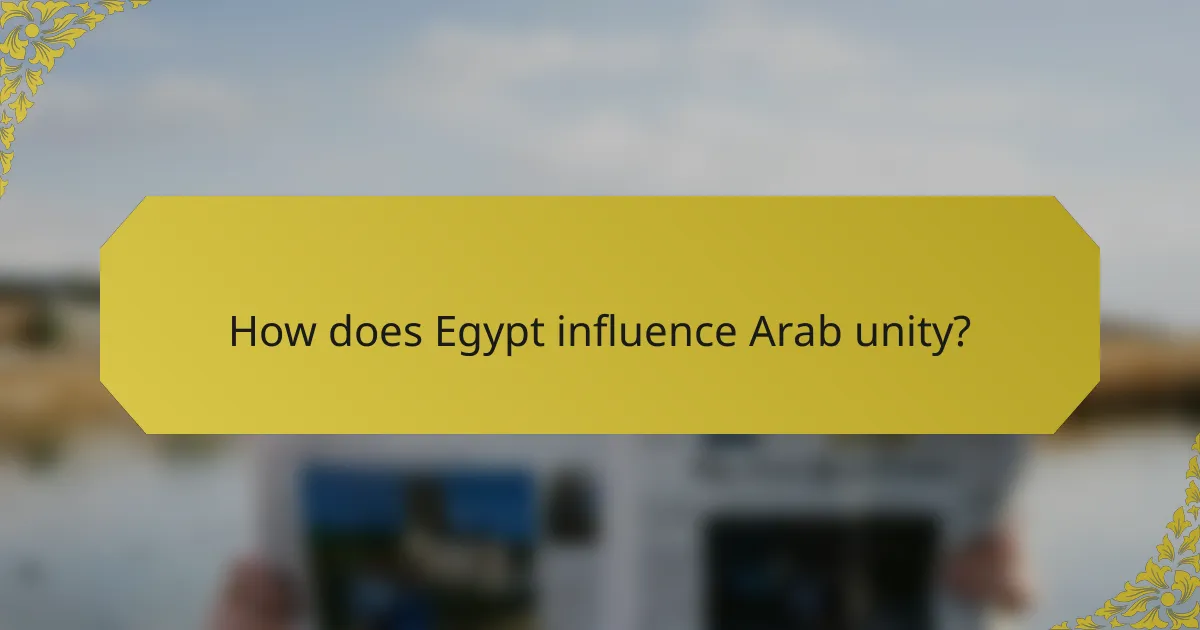
How does Egypt influence Arab unity?
Egypt influences Arab unity primarily through its political leadership and cultural significance. As one of the largest and most populous Arab nations, Egypt plays a pivotal role in regional politics. Historically, Egypt has been a leader in pan-Arab movements, advocating for unity among Arab states. The Arab League, headquartered in Cairo, serves as a platform for Egypt to promote collaboration among member states. Egypt’s strategic position in the region allows it to mediate conflicts and foster dialogue. Additionally, its cultural contributions, including media and education, help shape Arab identity. Egypt’s involvement in key political agreements, such as the Camp David Accords, exemplifies its influence on Arab diplomatic efforts. Overall, Egypt’s combination of political, cultural, and historical factors solidifies its role in promoting Arab unity.
What historical context supports Egypt’s role in Arab unity?
Egypt has played a pivotal role in Arab unity throughout history. The establishment of the Arab League in 1945 was significantly influenced by Egypt’s leadership. Egypt’s President Gamal Abdel Nasser emerged as a prominent advocate for Arab nationalism in the 1950s. His policies aimed to unite Arab nations against colonialism and imperialism. The 1967 Six-Day War further galvanized Arab identity and solidarity, despite its challenges. Egypt’s cultural and historical significance as a cradle of civilization also fosters its leadership in the Arab world. The nation’s strategic location and military strength contribute to its influential status. Egypt’s involvement in key regional conflicts has often sought to unify Arab states in response to external threats. Thus, Egypt’s historical context underscores its central role in promoting Arab unity.
How have past alliances shaped current perceptions of Egypt in the Arab world?
Past alliances have significantly influenced current perceptions of Egypt in the Arab world. Historically, Egypt’s role in the Arab League established it as a leader among Arab nations. The 1950s and 1960s saw Egypt’s alliances with other Arab states, particularly during the Pan-Arabism movement. These alliances fostered a sense of unity and collective identity among Arab countries. Egypt’s military engagements, such as the wars against Israel, further solidified its image as a defender of Arab interests. However, shifting alliances, particularly with Western nations, have led to mixed perceptions. Critics argue that Egypt’s alignment with the U.S. has compromised its standing in the region. Additionally, the 2011 revolution and subsequent political changes have affected Egypt’s regional influence. Overall, Egypt’s historical alliances continue to shape its complex identity in the Arab world today.
What are the implications of Egypt’s leadership in regional organizations?
Egypt’s leadership in regional organizations enhances its diplomatic influence and regional stability. Egypt plays a pivotal role in the Arab League and the African Union. This leadership position allows Egypt to mediate conflicts and promote cooperation among member states. For instance, Egypt facilitated peace talks in the Libyan conflict, showcasing its diplomatic capacity. Additionally, Egypt’s leadership fosters economic collaboration, as seen in initiatives like the African Continental Free Trade Area. This involvement helps strengthen trade ties and economic integration in the region. Egypt’s strategic location also positions it as a critical player in security matters, particularly regarding counter-terrorism efforts. Overall, Egypt’s leadership in regional organizations significantly impacts political dynamics and economic development in the Arab world and Africa.
What challenges does Egypt face in promoting Arab unity?
Egypt faces several challenges in promoting Arab unity. Political instability in the region undermines collective efforts. Conflicting national interests among Arab states create divisions. Economic disparities hinder collaboration on joint initiatives. Historical rivalries, such as those between Egypt and other nations, complicate unity efforts. Additionally, varying governance models lead to differing priorities. The influence of external powers often disrupts regional cohesion. Lastly, public sentiment in various Arab nations may not align with unity efforts. These factors collectively impede Egypt’s ability to foster Arab unity effectively.
How do internal political issues affect Egypt’s external relations?
Internal political issues in Egypt significantly impact its external relations. Political instability can lead to a decrease in diplomatic effectiveness. For example, during the Arab Spring, Egypt faced internal upheaval which strained its relationships with neighboring countries. The shift in power dynamics often results in a re-evaluation of foreign alliances. Additionally, domestic unrest can distract from international commitments and negotiations. Economic challenges stemming from internal politics may also limit Egypt’s ability to engage in foreign aid or military partnerships. Consequently, Egypt’s internal political climate directly influences its foreign policy decisions and regional standing.
What external factors hinder Egypt’s efforts towards Arab unity?
Regional conflicts hinder Egypt’s efforts towards Arab unity. Ongoing tensions in Syria, Yemen, and Libya divert focus from unity initiatives. Rivalries with countries like Qatar and Turkey complicate diplomatic relations. The influence of external powers, such as the United States and Russia, affects regional dynamics. Economic challenges in Egypt limit its ability to lead unification efforts. Additionally, differing political ideologies among Arab states create divisions. Historical grievances further exacerbate mistrust among nations. These factors collectively obstruct Egypt’s pursuit of a cohesive Arab identity.
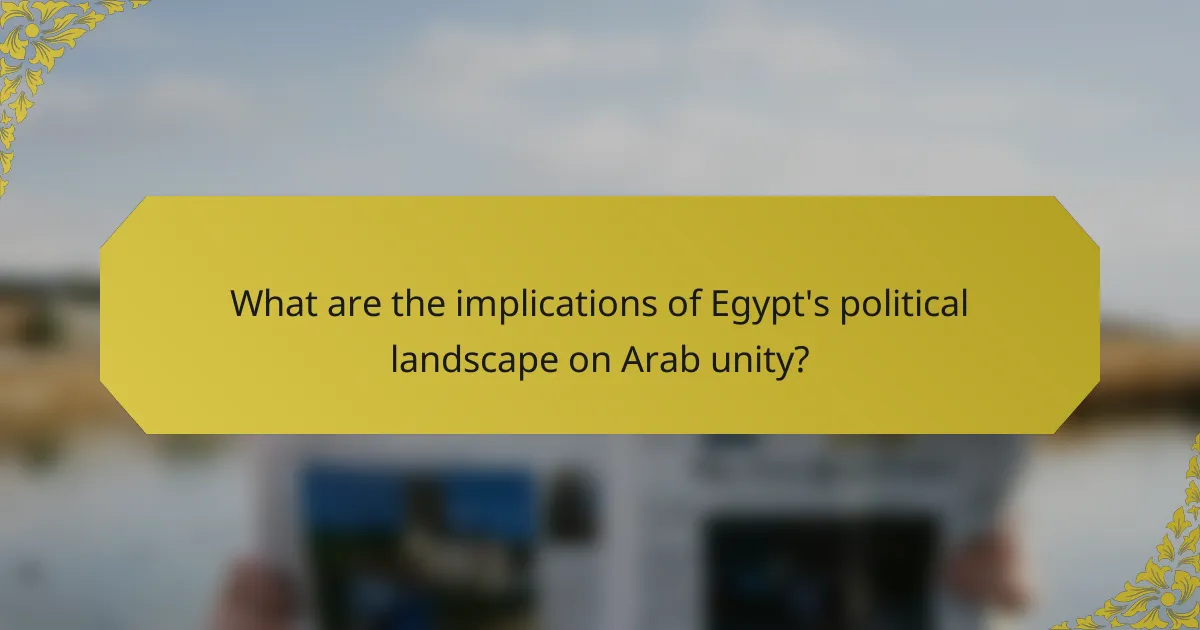
What are the implications of Egypt’s political landscape on Arab unity?
Egypt’s political landscape significantly influences Arab unity. Historically, Egypt has been a leader in the Arab world. Its political stability or instability directly affects regional dynamics. For instance, during the Arab Spring, Egypt’s upheaval led to a fragmentation of Arab solidarity. Additionally, Egypt’s foreign policy shapes alliances among Arab nations. The Camp David Accords with Israel exemplify Egypt’s unique role and its implications for Arab unity. Furthermore, Egypt’s economic challenges can impact its ability to lead. A strong Egypt can foster cooperation, while a weak one may lead to disunity. Thus, Egypt’s political situation remains crucial for Arab cohesion.
How does Egypt’s domestic policy impact its foreign relations?
Egypt’s domestic policy significantly influences its foreign relations. The government’s focus on stability and security shapes its diplomatic strategies. For instance, economic reforms aimed at improving domestic conditions enhance Egypt’s bargaining power internationally. Additionally, Egypt’s policies towards human rights and governance affect its relationships with Western nations. Countries often evaluate Egypt’s domestic situation when considering aid and partnerships. Furthermore, Egypt’s role in regional conflicts, driven by internal policies, impacts its alliances in the Arab world. The 2011 Arab Spring demonstrated how domestic unrest can alter foreign relations dramatically. Egypt’s leadership must balance internal priorities with external diplomatic needs to maintain its influence.
What specific policies have been implemented to enhance regional cooperation?
Egypt has implemented several specific policies to enhance regional cooperation. These include active participation in the Arab League to foster unity among member states. Egypt has also initiated bilateral agreements focused on trade and security with neighboring countries. Additionally, the country has hosted various summits aimed at addressing regional issues collaboratively. Egypt’s involvement in peacekeeping missions further demonstrates its commitment to regional stability. The establishment of joint military exercises with Arab nations has strengthened defense cooperation. Furthermore, Egypt has promoted cultural exchanges to enhance mutual understanding among Arab states. These policies collectively aim to create a more integrated and cooperative Arab region.
How do public perceptions in Egypt influence its diplomatic strategies?
Public perceptions in Egypt significantly influence its diplomatic strategies. The government often tailors its foreign policy to align with the views and sentiments of its citizens. For instance, public opinion can shape the nation’s stance on regional conflicts, such as the Israeli-Palestinian issue. When there is strong public support for a particular stance, the government is likely to adopt a more assertive diplomatic approach. Conversely, negative public sentiment can lead to a more cautious or conciliatory foreign policy.
Research indicates that Egyptian leaders are acutely aware of the impact of public opinion on their legitimacy. The Arab Spring highlighted how public dissatisfaction can lead to political upheaval. Consequently, the government monitors social media and public discourse to gauge sentiment. This feedback loop informs diplomatic decisions, especially regarding alliances and negotiations.
In summary, the interplay between public perceptions and diplomatic strategies in Egypt is critical. The government seeks to maintain stability by addressing public concerns in its foreign relations. This dynamic shapes Egypt’s role in regional diplomacy and its relationships with other Arab nations.
What lessons can be learned from Egypt’s political landscape for other Arab nations?
Egypt’s political landscape offers several lessons for other Arab nations. Firstly, the importance of public engagement in governance is evident. The 2011 revolution highlighted the power of citizen mobilization. Secondly, the role of social media as a tool for political organization cannot be underestimated. It facilitated communication and coordination among activists. Thirdly, the impact of economic stability on political legitimacy is crucial. Economic challenges can lead to unrest, as seen in Egypt. Lastly, the necessity of addressing diverse political ideologies is clear. Acknowledging various factions can foster national dialogue and unity. These lessons are applicable across the Arab world for promoting stability and governance.
What best practices can be identified from Egypt’s approach to governance?
Egypt’s approach to governance includes several best practices. One key practice is centralized decision-making, which allows for swift policy implementation. This has been evident in Egypt’s economic reforms initiated in 2016, aimed at stabilizing the economy. Another practice is strategic regional diplomacy, where Egypt plays a leading role in Arab League initiatives. This enhances collaboration among Arab nations on security and economic issues. Additionally, Egypt emphasizes public-private partnerships to boost infrastructure development. These partnerships have facilitated large projects, such as the New Administrative Capital. The focus on national security is also paramount, with Egypt investing in military modernization. This is crucial for maintaining stability in a volatile region. Overall, these practices contribute to Egypt’s influence in the Arab world and its governance effectiveness.
How can other nations replicate Egypt’s successes in fostering unity?
Other nations can replicate Egypt’s successes in fostering unity by promoting inclusive governance and national dialogue. Egypt has historically engaged diverse social groups in decision-making processes. This approach builds trust and cooperation among citizens. Additionally, emphasizing shared cultural and historical narratives strengthens national identity. Egypt’s focus on education and public awareness campaigns also fosters a sense of unity. These initiatives help citizens understand and appreciate their common heritage. Furthermore, establishing platforms for peaceful conflict resolution can mitigate divisions. Countries can learn from Egypt’s experience in creating a cohesive national vision. By implementing these strategies, other nations can enhance social cohesion and unity.
What are the future prospects for Egypt’s role in Arab unity?
Egypt is poised to play a significant role in Arab unity in the future. Its historical leadership in the Arab world positions it as a key player. Egypt’s strategic geographical location enhances its influence in regional politics. The country’s active participation in organizations like the Arab League underscores its commitment to unity. Recent diplomatic efforts have aimed at resolving conflicts in the region, such as the Palestinian issue. Economic partnerships with Gulf states may strengthen Egypt’s position as a unifying force. Additionally, Egypt’s cultural and educational initiatives promote Arab identity and solidarity. Overall, Egypt’s future prospects in fostering Arab unity appear promising, driven by its political, economic, and cultural initiatives.
How might upcoming elections affect Egypt’s political stance in the Arab world?
Upcoming elections in Egypt may significantly influence its political stance in the Arab world. The elections could lead to a shift in leadership and policy direction. A change in government might alter Egypt’s approach to regional alliances. Historical context shows that Egypt has been a key player in Arab diplomacy. For instance, its leadership during the Arab Spring had profound implications for neighboring countries. If the new leadership prioritizes stronger ties with Gulf states, this could enhance Egypt’s influence. Conversely, a focus on domestic issues may lead to a more isolationist stance. The outcomes will likely shape Egypt’s role in addressing collective Arab challenges, such as security and economic cooperation.
What trends should be monitored to assess Egypt’s influence moving forward?
Key trends to monitor for assessing Egypt’s influence include economic partnerships, regional diplomacy, and security collaborations. Economic partnerships involve Egypt’s trade agreements and investments with neighboring countries. For instance, the African Continental Free Trade Area (AfCFTA) enhances Egypt’s economic role in Africa. Regional diplomacy focuses on Egypt’s involvement in Arab League initiatives and peace processes. Egypt’s mediation in conflicts, like the Palestinian issue, showcases its diplomatic significance. Security collaborations pertain to military alliances and counter-terrorism efforts, particularly with Gulf states. Monitoring these trends provides insights into Egypt’s evolving influence in the Arab world.
The main entity of this article is Egypt’s political landscape and its influence on Arab unity. The article examines Egypt’s semi-presidential system, the historical context shaping its political environment, and the role of key political entities and parties. It highlights the challenges Egypt faces in promoting Arab unity amidst internal political issues and external factors, as well as the implications of its domestic policies on foreign relations. Additionally, the article explores the lessons learned from Egypt’s governance approach and the potential future prospects for its role in fostering regional cooperation.
